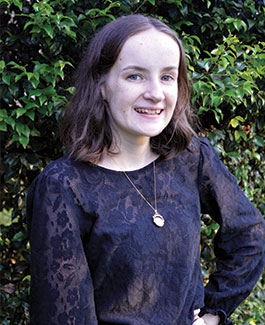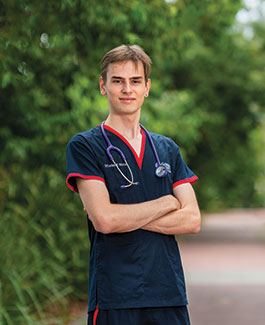Scholarship training the next generation of autism researchers.
Difficulty in getting a diagnosis for their son led the Dyer family to create a scholarship committed to training the next generation of autism researchers.
The Dyer family’s lived experience with autism has led to the establishment of the Michael Nathanial Dyer PhD Scholarship Program to help advance knowledge and support for individuals with autism.
I knew that I now had the opportunity to make real and impactful change.
Louise White
As young parents, Elga and David Dyer had no idea what to expect with a newborn. Very early on, they noticed their son was very clingy to his mother, often calling out for her in the night and following her
everywhere. Whereas other children would happily play with toys, Michael stayed firmly in Elga’s lap.
Despite both his parents suspecting there were differences in Michael’s development, medical professionals at the time missed all the signs for autism, proclaiming that everything was fine.
Even worse, further hospital visits led to Michael being put on high doses of drugs that made him like a “zombie” without actually diagnosing him with anything. “It still haunts me,” Elga says. “[The psychologist] made me feel as if it was all my fault that Michael was the way he was. Our search for a diagnosis continued and we never gave up.”
Finally, when Michael was an adult, Elga read a magazine article about autism that listed his symptoms exactly.
"Me, a mum, diagnosed my son, when all the medical experts we’d seen couldn’t. I showed the article to David and Michael and they both agreed with me.”
Difficulty in getting a diagnosis for their son led the Dyer family to link with a world-leading autism research centre,
Griffith University’s Autism Centre of Excellence (ACE) and create a scholarship committed to training the next generation of autism researchers.
“The purpose of this scholarship is that hopefully research will advance so that parents don’t have to feel as helpless and frustrated as David and I did,” Elga explains.
Louise White is the inaugural scholarship recipient. She says she knew her life was about to change when she discovered her application had been successful.
“I could not believe that, through the generosity of a family I had never met, I was being given the opportunity to complete research that will improve how schools and families support autistic young adults to make one of the biggest changes in their lives,” she says.
“As both a teacher and a mother of an autistic son, I knew that the move from school into work or further study represents a key time that we need to be supporting autistic young people, but I also knew that researchers weren’t able to tell parents or teachers how best to do it.
“All this was in my mind as I realised I had won the scholarship—I knew then that I now had the opportunity to make real and impactful change.”
Louise says she first realised she needed to learn more about autism when her son Edward was diagnosed. “I knew that I wanted knowledge to be able to support him, advocate for him and to help to secure the best possible outcomes for him,” she says.
“This led me to completing the Graduate Certificate in Autism Studies through the Autism Centre of Excellence at Griffith University. Through this program, I met Professor Dawn Adams, Dr Kate Simpson, and Dr Stephanie Malone—all phenomenal teachers who encouraged us to become reflective, curious, critical thinkers.
“The more I learnt, the more I realised we need to learn. Each time I had the chance to focus an assignment on a specific topic, I chose to focus on transitions, especially big life-stage transitions. I chose this because it is an area that my son has found to be particularly challenging, and I want to know how to best support him.
“However, I was constantly frustrated when I had to finish every assignment saying that we needed more research to tell us more in this area. I kept thinking about how, maybe, just maybe, one day, people wouldn’t have to write that sentence any more, because there will have been advances in the body of knowledge needed in this area.
“This scholarship means that, not only is research advancing in this much-needed area but, unbelievably, I am part of making that happen. I am able to spend three years creating research that is completely designed to find out how we can best support autistic young adults as they transition out from school and into adulthood. Finally, I can do something that means that the post-school outcomes for my child, and for thousands of other parents’ children, could be improved. I consider this to be such an important undertaking that, without the scholarship, would just not be possible.”
Through her hard work and dedication, Louise and her research team have been able to meet with the Dyers to share their experiences of being parents to autistic children—even though their experiences have been decades apart.
“I have been able to thank them for their generosity, and for trusting me to realise their vision for this scholarship and the research that it will enable,” Louise explains.
“Every time the research gets hard, and sometimes it really does, I think of how important it is, and how it will benefit our children, and the children in so many other families. It is their generosity that is making this all possible—because of them, we can truly work to make powerful and positive change.”
More than $100 million of philanthropy has already been secured to create a brighter future for all.
Read more impact stories

Scholarship takes pressure off
Funded by the Adam Scott Foundation, created to provide life opportunities for Australian youth, and enhance life and career possibilities, this scholarship supports students who have overcome adversities in their life allowing them to achieve their dreams.

Opal HealthCare Nursing Scholarship
Scholarship recipient, Bodhi Thwaites has first-hand experience proving it isn’t just about alieving financial burdens, but providing a supportive environment and nurturing a passion, allowing him to reach his aspirations of becoming a mental health nurse.

Changing the lives of mothers in prison and their children
Prof Susan Dennison's team are piloting programs to change the lives of incarcerated mothers, approaches that are designed to reduce reoffending and put an end to intergenerational cycles of adversity.